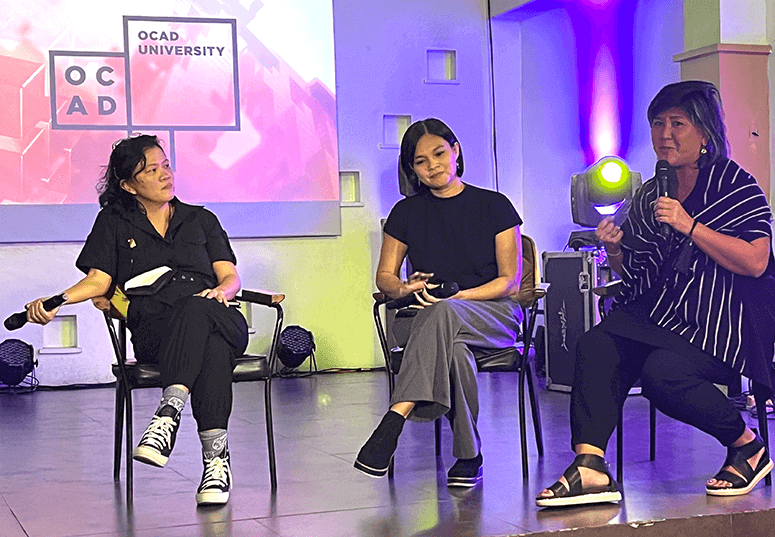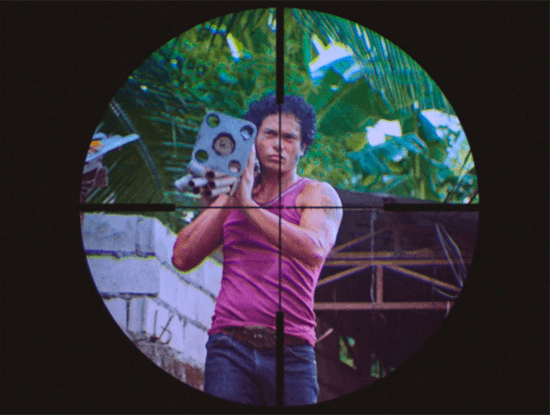Beyond Sundance
The indie feature film Leonor Will Never Die, written and directed by 29-year-old Martika Ramirez Escobar and produced by Arkeofilms and Anima, gained surprise acclaim last January when it won the Sundance Jury Award for Innovative Spirit in World Dramatic Competition.
Subsequently, it became the opening film of Cinemalaya 2022 and the closing film of the Toronto International Film Festival Midnight Madness Section, where it won the Amplify Voices Award. It also recently won at SITGES Film Festival for Noves Vision Best Director.
I was lucky to receive an invite to attend a special screening of the film “and an artist-soiree” on Oct. 18 at the Gravity Art Space on Mother Ignacia St. in Quezon City. Hosting the event in partnership with the DAKILA Artists Collective was the Ontario College of Art and Design University (OCAD University).

OCAD U.’s president and vice chancellor, Ana Serrano, happens to be a daughter of dear old friends. She hadn’t visited home for some time. It would’ve been a merrier reunion had her other titos, direk Tikoy Aguiluz and Eric Villegas, and her tita Chit Villegas, also showed up that evening. But their own get-together pulled through a couple of nights later.
Instead, I renewed acquaintance with indie film partners Monster Jimenez and Mario Cornejo, who turned out to be the film producers. The 99-minute film screening was followed by Ana Serrano’s presentation on the possible opportunities for collaboration between OCAD and the Filipino artist community. A Q&A ensued with the participation of Monster Jimenez and sound designer Corinne De San Jose, who subbed in the absence of the director.

As the first Filipino-Canadian university president, Ana stressed that she wants Filipinos all over to know that OCAD is not only Canada’s oldest, largest and most prestigious art, design and media university, but is also “an institution committed to equity, inclusion and diversity and home to the most diverse group of artists, designers and scholars.”
She added: “We believe art and design are critical to building a just, equitable and sustainable world. And we want to work with artists and designers around the world who share this vision, including the many talented Filipinos who are today’s much-needed visionary artistic leaders, like Martika Escobar and Monster Jimenez and their team.”

For her part, Monster recounted how it took all of eight years for Martika to complete her first feature-length film, from the time she conceived it as a zany comedy and presented the script. Subtitled Ang Pagbabalik ng Kwago, the movie-within-a-movie pays homage to 1970s and 1980s Filipino action films, with Sheila Francisco as the “action star grandmother” — a retired action-film writer-director who returns to her typewriter to resolve financial difficulties. An accident gets her into a coma, from where her imagination runs even wilder.
It’s zany because it replicates the way Filipino action movies unfolded somewhat crudely during her heyday, with scenes of dramatic suspense and violent action — involving the usual crime boss, henchmen, neighborhood goons, a macho hero saving a bar girl, and the aging scriptwriter herself — suddenly giving way to musical numbers replete with full-ensemble dance choreography.
As sound designer Corinne De San Jose recalled, she had a challenging time simulating the awful sound quality of an earlier era, having to shift back and forth from digital to analogue recording. Hearing her recollect the technical legerdemain finally had me dismissing my initial perturbance over the film’s grating audio that supplemented the de numero fisticuffs, gun battles and clichéd dialogue. Apparently, this was what instinctive cineastes immediately appreciated as the spirit of innovation that was welcomed at Sundance.
A graduate from the University of the Philippines’ film school, writer-director Martika Escobar couldn’t believe it when her film was offered a screening at Sundance. Even more elated that it won a prize, she has since reflected: “It is rare for a filmmaker to be given absolute creative freedom, and it is also rare to have a young Filipina filmmaker enter a big festival such as Sundance, and even rarer for an unconventional film such as ours to be recognized.”
Monster Jimenez filled in: “There’s a lot of expectation when you make a movie for a very long time. It’s not so much the burden that others will put upon you, but the pressure that you put upon yourself. I would say it should take about two to four years to develop a movie, but that’s just me because I prefer a slow cook. But if you look at the bright side, I think you start to grow up at the same time as the film. I saw it in Martika as well, especially when we came to a standstill during the pandemic. She was able to examine what her film was becoming. She never dropped the ball and never gave up even if it was so hard to work during the lockdown. Kudos also to the post team as well as to our actors who continued to support the additional work during that time.
“Leonor getting in Sundance was a shot in the dark. We just submitted the film on Filmfreeway, which is a fest submission site. We didn’t use any connections or pull any favors. The Sundance programmer, Heidi Zwicker, couldn’t believe that the film wasn’t endorsed by anybody, and was just submitted cold. For her it felt like such a big advantage because there were no expectations and it felt like a discovery.
“Being there opened so many opportunities not just for the film but for such an original thinker like Martika Escobar. We’ve had successful runs in major festivals like Melbourne, Fantastic Fest, Karlo Vivary, Toronto, Sitges (Spain) and so on, or about 50 festivals at this point! And now we will end the year with a North American theatrical distribution. Our distribution strategy has always been to prioritize theatrical screenings and try to push back the platform once it has gathered enough momentum in theaters.
“It’s a more creative approach by reaching out to people who want to buy the show rather than setting it up as a traditional commercial run. We’ve had very good responses from schools and institutions, as well as show buyers who just want to block screen the film.”
Local screenings will be held at TriNoma on Nov. 13 and 20 at 5 p.m., and Cinematheques nationwide on Nov. 26-27, December 3 and 9. SinePop screenings can be held in Cubao by demand at P8,000 for a maximum of 25 people.
Theatrical distribution includes screenings in the US by Music Box, starting in Metrograph Theater in NY on November 25, and at various theaters in LA, Seattle, Chicago, and other major cities. Leonor Will Never Die has also secured theatrical distribution in the UK and Ireland, Japan and Middle East.
Get in touch with the Leonor Team if you are interested in renting the film and showing it in a cinema or your own venue. Email leonorwillneverdie@gmail.com or follow on Facebook and Instagram.


